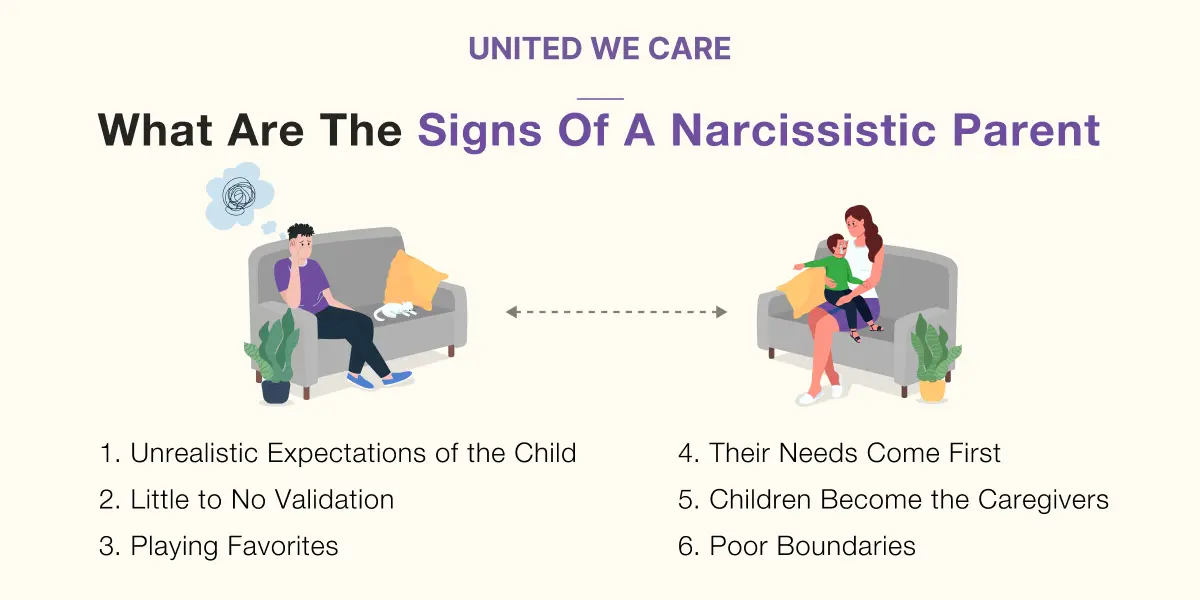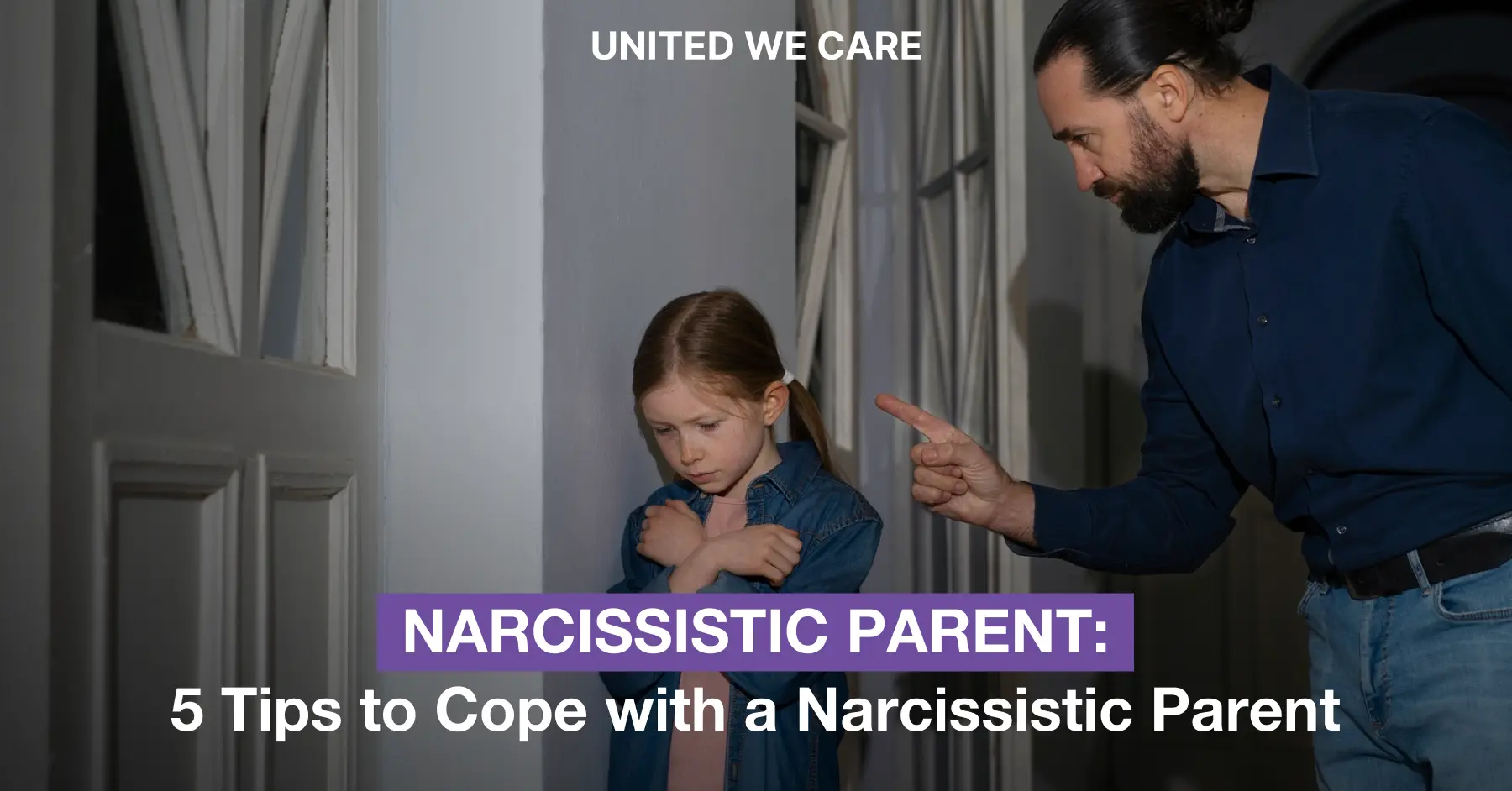Introduction
A narcissistic parent is someone suffering from a personality disorder such as narcissistic or borderline personality disorder. It can also be a parent with other unhealthy mechanisms to cope with poor mental health. Either way, the narcissistic parent is cold, self-absorbed, unempathetic, and manipulative.
Essentially, like most narcissists, parents with narcissistic tendencies are very bad at raising children because of their self-centeredness. They tend to put their needs ahead of their child’s and are often invalidating the child’s needs.
Who are Narcissistic Parents?
It is important to understand that only a licensed mental health professional with the appropriate qualifications can diagnose someone as a narcissist. Even then, it is only possible if the narcissistic individual voluntarily starts therapy. Until then, one can only make an educated guess whether a person or parent is narcissistic.
Nevertheless, we need not label the person to recognize unhealthy patterns of behavior. If you feel that your parent is behaving with you in narcissistic ways, you have the right to use this label to understand how to protect yourself.
Primarily, a narcissistic parent is someone deeply self-involved to the point of grandiosity. They are terrible at taking feedback or admitting their mistakes. Generally, they blame others (especially their children) for anything that they perceive is wrong.
Read more about narcissistic personality disorder
Symptoms of a Narcissistic Parent
Let’s elaborate further on the behavior of a narcissistic parent. The following are a few examples of how a narcissistic parent tends to behave. If you see these signs in your mother or father, you might be dealing with a narcissistic parent.

Unrealistic Expectations of the Child
Commonly, the narcissistic parent will have several unreasonable expectations from their child. Usually, this is because they tend to see the child as an extension of themselves, not an individual with their own needs and desires.
They will pressure the child to be the best at everything and show extreme disapproval if they fall short.
Little to No Validation
Tragically, even if the child goes through hell to meet all these unrealistic expectations, it never seems to be enough. The narcissistic parent almost never acknowledges the child’s effort and very rarely offers validation.
Instead, the narcissistic parent is more likely to find minor flaws and focus on them entirely. They might even compare their child to others or try to take all the credit for their achievements.
Playing Favorites
Generally, if the narcissistic parent has more than one child, they will pick a favorite and pit the kids against each other. They tend to purposely try to stir the pot, creating unnecessary drama and competition between siblings.
Often, they will lie about or criticize one child behind their back just to instigate the other children. The narcissistic parent lives for such conflict and melodrama.
Their Needs Come First
No matter how grave the child’s needs, the narcissistic parent will always put themselves first. The only time they show concern for their kids is when they are being observed by an audience. Even then, it can be a bit excessive and just for show.
On the rare chance that they actually try to deliver their children’s needs, there is usually an ulterior motive. They won’t let the child forget about the ‘favor’ and may even weaponize it to manipulate them.
Children Become the Caregivers
Since narcissistic parents are terrible at looking after their children, the kids are forced to look after themselves. If there is more than one child, the older sibling or the middle child usually becomes the responsible one.
Unfortunately, this forces the kids to grow up sooner than they’re supposed to. They often grow into adults with a missing childhood. That kind of trauma almost always stays with the individual for decades.
Poor Boundaries
More often than not, narcissistic parents have no concept of healthy boundaries. They do not think that their children deserve privacy or need to develop autonomy. Furthermore, they think they are entitled to do whatever they want to control their children.
Even if the child makes an attempt to assert their boundaries, the narcissistic parent has no respect for this process. They walk all over their children, treating them like doormats.
More Information -Narcissistic Relationship
Effect of Having a Narcissistic Parent
Clearly, having a narcissistic parent is pretty much a nightmare. Imagine having a permanent authority figure in your life that is so self-absorbed that you don’t matter. Naturally, this has a long-lasting impact on the life of the child, which persists even after reaching adulthood and finding autonomy.
Low Self-Worth
Firstly, children of narcissistic parents grow to have very low self-worth and self-esteem. The chronic criticism and repeated invalidation make them develop the core belief that they do not deserve to be happy.
They truly believe that they do not deserve love, joy, and all good things in life. Consequently, they are prone to self-sabotage and poor life choices.
Being Too Hard on the Self
Along with the low self-worth, feelings of self-blame and self-hate go hand in hand. The child of a narcissistic parent will always have a running commentary in their head pointing out all their flaws and insecurities.
It’s almost as if they have a vicious inner critic that maintains a very loud presence inside their head. As a result, the individual is often excessively hard on themselves, feeling shame and guilt when unwarranted.
Unhealthy Relationships
Understandably, an adult child of a narcissistic parent has way too many obstacles preventing them from establishing healthy relationships. Their low self-worth prevents them from having high standards.
They feel that even the bare minimum of affection, care, and respect is more than what they deserve. On top of that, the obvious attachment trauma that develops because of the narcissistic parent’s behavior causes them to have insecure attachment styles.
Hyper-Independence
Most children of narcissistic parents are suffering from severe childhood emotional neglect. One of the main consequences of this phenomenon is a tendency of hyper-independence. This means that the child feels uncomfortable asking for or receiving help.
They are so used to doing everything for themselves that receiving care is an alien concept for them. It feels unfamiliar and painful because they deeply fear losing that affection.
Mental Health Issues
Obviously, with all this emotional baggage, it is only natural for a person to develop mental health issues. Children of narcissistic parents tend to suffer from problems like anxiety, chronic stress, depression, neurodivergence, and complex trauma.
These issues are generally pervasive and affect all areas of life. Recovery becomes a long and complicated process that may take several years.
How to cope with a Narcissistic parent
Set Boundaries:
Firstly, we need to take care of our mental wellbeing. Set up clear boundaries with our narcissistic parents. Decide what behaviors are acceptable and unacceptable. Clearly, talk with them about these boundaries assertively but calmly.
Seek Support:
Find a support system outside of our family, such as friends, other relatives, or a therapist. Sometimes, If we talk to someone who can offer support, empathy, and guidance, they may help our problems when dealing with a narcissistic parent.
Practice Self-Care:
Self-care of our physical and emotional is essential. It helps with stress relief. Hobbies, exercise, meditation, or spending time with supportive people are helpful.
Manage Expectations:
You may not be able to change your narcissistic parent. Your adjustment expectations help you. But we can control our own reactions and behaviors. Accepting that we cannot change them. We may help to reduce frustration and disappointment.
Distance Yourself When Necessary:
Sometimes, your relationship with your narcissistic parent becomes toxic or harmful to your mental health. Your own safety and well-being are also important. Sometimes, physical or emotional distance may be necessary for your own mental health and growth.
Therapy for Narcissistic Parents
It is very rare that a narcissist approaches a mental health professional for help. They have so much denial that it’s unlikely for them even to admit that there is something wrong with their patterns of behavior.
Hence, it is the people around the narcissist who end up having to go to therapy. In the context of narcissistic parents, it is the children who are in severe need of professional guidance.
One must look for a trauma-informed therapist and take the support of medication as and when required. It is also crucial to look for family therapists, somatic therapists, and a couple’s therapist if the adult child of a narcissist enters an intimate relationship.
Conclusion
As mentioned before, having a narcissistic parent is nothing short of torture. The impact of all the narcissistic behavior patterns is immensely detrimental and all-pervasive. Furthermore, the impact of the missing ingredients of a good upbringing also exacerbates things.
Due to such sever childhood emotional neglect and narcissistic abuse, children of narcissistic parents suffer for most of their lives. They are unable to achieve wellbeing and tend to develop several mental health complications. If you think your parent is narcissistic, speak to our experts at United We Care. You can rest assured knowing that we can offer you the support and guidance you need.
References
[1] Leggio, J.N., 2018. Mental health outcomes for adult children of narcissistic parents (Doctoral dissertation, Adler School of Professional Psychology).
[2] Edery, R.A., 2019. The traumatic effects of narcissistic parenting on a sensitive child: a case analysis. Health Science Journal, 13(1), pp.1-3.










